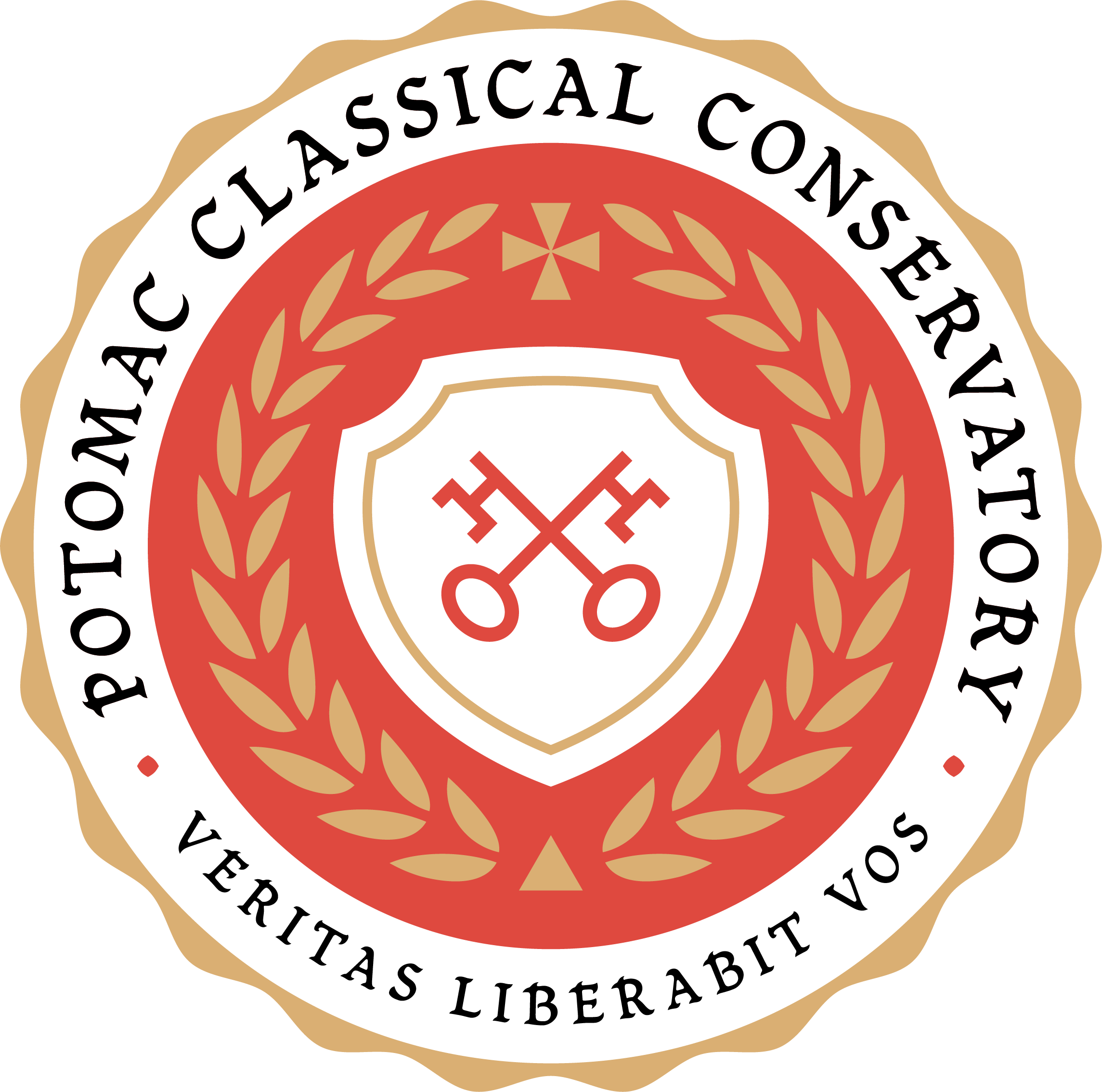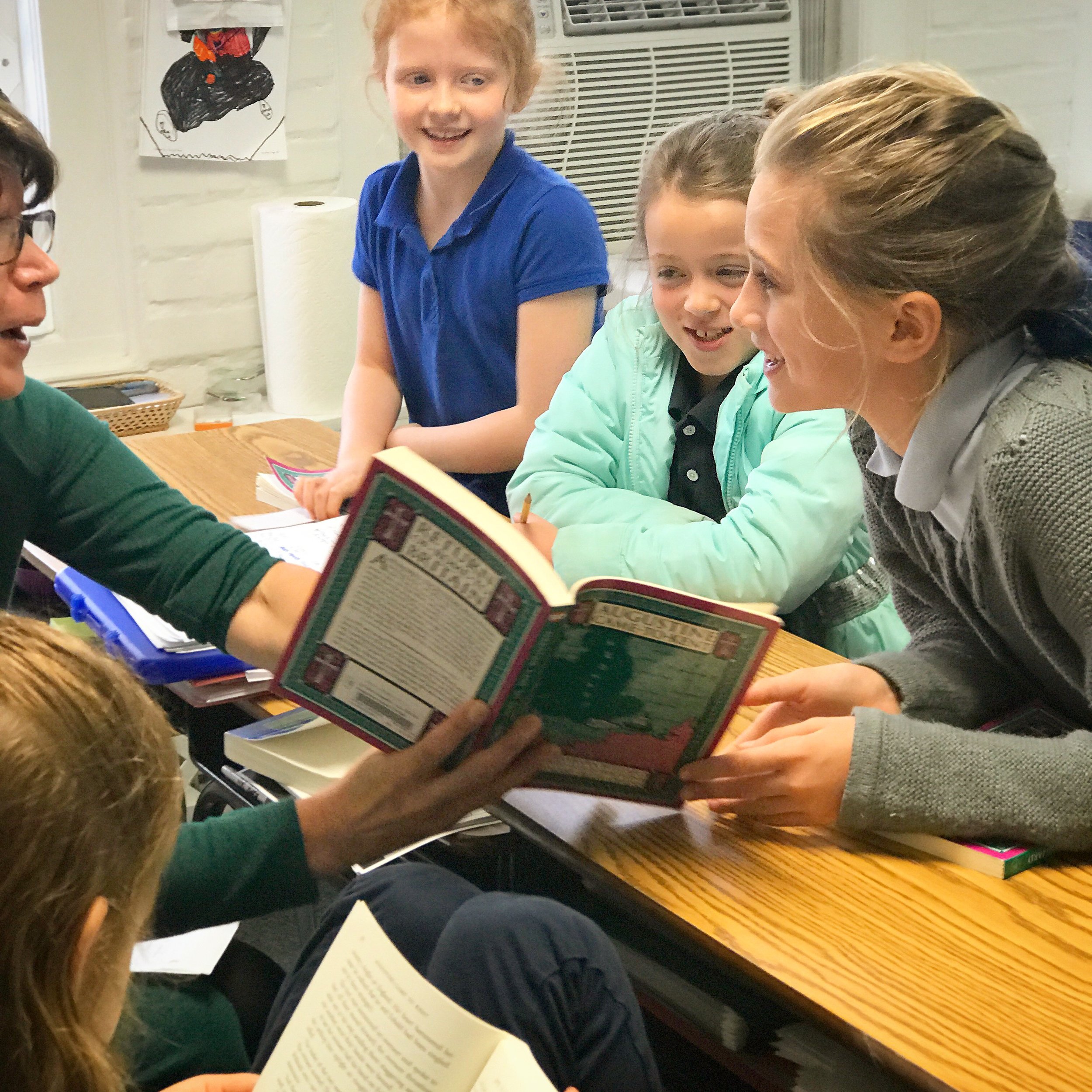Curriculum
All About Reading
Custom Generated Literature Lists
Discovery of Deduction Logic
Elemental Science
Grammar for the Well-Trained Mind
Growing with Grammar
LatinAlive!
Latin for Children
Logic of English
Math in Focus (Singapore Math)
MegaWords Spelling
Mind Benders
Mystery of History
Prescripts
Song School Latin
Tapestry of Grace History
The Story of the Middle Ages
think! Mathematics (Singapore)
Weekly Aesthetics Classes; Picture Study
Weekly Choir
Weekly Art Classes
Weekly Music Classes
Well-Ordered Language
Writing & Rhetoric
Zaner Bloser Handwriting
“Potomac Classical’s education creates lifelong learners, hones critical thinking skills, and develops confident, well-rounded young citizens.”
The Trivium
Classical education is often characterized as a three-stage process through which students move at appropriate developmental stages. Known collectively as the Trivium, these three stages are grammar, logic, and rhetoric, and are the tools we apply to the discovery of subject matter as well as the subject matter itself. Once students master these tools of learning, reasoning, and communication, they can and will continue to utilize them for a lifetime. These tools are taught throughout every grade at Potomac Classical, but with particular emphasis appropriate to student development.
Grammar is emphasized essentially in our K-5th grades as the most fundamental building block for effective reading and writing, and includes extensive development of vocabulary and the acquisition of factual information across subject areas.
Logic is the primary emphasis during the middle school years when students are most eager to debate, to discuss, and to draw connections. Given the tools of effective, respectful construction and deconstruction of arguments, students engage one another, their teachers, and their world with reason and clarity.
Well-equipped with the tools of grammar and logic, Rhetoric students — essentially students the high school grades — are prepared to present their scientific findings, faith convictions, art, creative and expository writing, and research with wisdom and eloquence.
The Trivium formed the basis for traditional liberal arts for centuries with the goal not primarily to educate students in what to think, but in how to think — thoroughly, maturely, and biblically — toward a Christian moral end.
Latin
Across the country, classical schools are restoring the once common practice of formal Latin instruction. Far more than a means to improved college entrance exam scores, Latin unlocks the study of all romance languages, and profoundly increases English vocabulary. Students are equipped to read the foundational literature of our culture, to correctly decipher unfamiliar scientific, legal, and mathematic terms and to most fully participate in what has been called “The Great Conversation.” At Potomac Classical Conservatory, students begin their discovery of Latin roots in 3rd grade and continue through 9th grade.
“Education is not a subject, and does not deal in subjects. It is instead a transfer of a way of life.”
Great Books: The Great Conversation
“The tradition of the West is embodied in The Great Conversation that began in the dawn of history and that continues to the present day.”
—Robert Maynard Hutchins
“What binds the authors together in an intellectual community is The Great Conversation in which they are engaged. In the works that come later in the sequence of years, we find authors listening to what their predecessors have had to say about this idea or that, this topic or that. They not only harken to the thought of their predecessors, they also respond to it by commenting on it in a variety of ways.”
—Mortimer Adler
Why do certain books endure throughout time and across cultures? What do they have in common and why do they stir rich conversation and provoke reflection among readers of all ages? We believe such books, often considered “the classics,” promote that which most resonates with the mind and soul—the true, good, and beautiful. Created in God’s image (Imago Dei), our minds and souls respond to those human experiences that reveal the sacred and eternal. At Potomac Classical, we believe making space for The Great Conversation, the reading, contemplation and discussion of the classics, is not a diversion from the task at hand; it is a joy and a core responsibility.
Covenantal Partnership
Potomac Classical Conservatory takes seriously her role in loco parentis — that is, assisting parents in the matter of formal education, by their express delegation rather than by right. To that end, we highly value and expect parent participation in the life of our school.
We strive for a culture of mutual support, of honoring parents by listening well, welcoming involvement, and together, building a Christ-centered and fruitful community of faith and learning.
Christ-Centered
Potomac Classical Conservatory is a place of joy and growth, a place where both the mind and soul are cultivated.
More than a Bible class and a Matins service, we desire our students to see Christ preeminent in every area of life, interwoven into every discipline. From being a priority during playful competition to being the object of our worship through the arts, understanding Christ’s preeminence over all is worthy of our best efforts and highest devotion.
Training the Affections
Created in God’s image (Imago Dei), every person has the capacity to “love what is lovely” (Titus 1:8) and to “abhor that which is evil” (Romans 12:9). Sadly, our brokenness distorts our understanding of truth, goodness and beauty and in sin we pursue those things that lead away from God and toward personal and community destruction.
As a community of faith and learning, Potomac Classical is uniquely positioned to intentionally place before our students the most noble, most just, most beautiful objects of study—holding in high esteem models of excellence throughout history. Class after class, students spend the best hours of their day considering, and at times imitating masters, writers, scientists, pilgrims, and saints.
Training the affections to love what is lovely is a corporate and counter-cultural task, and one that must be made in partnership with parents and the wider school community. We are thankful for the role each plays, and gratefully welcome God’s redemptive work among us.
Shepherding
The shepherding of young hearts and minds is a high privilege and great responsibility. Building space into each day for teachable moments, even at inopportune times, is a discipline we encourage at Potomac Classical. Addressing student behavior privately, respectfully, and with a true desire to understand the heart issue rather than simply modify behavior, costs time and attention in the short-term. In the long-term, we believe this time is well invested and bears fruit for the individual student and the entire classroom community.


